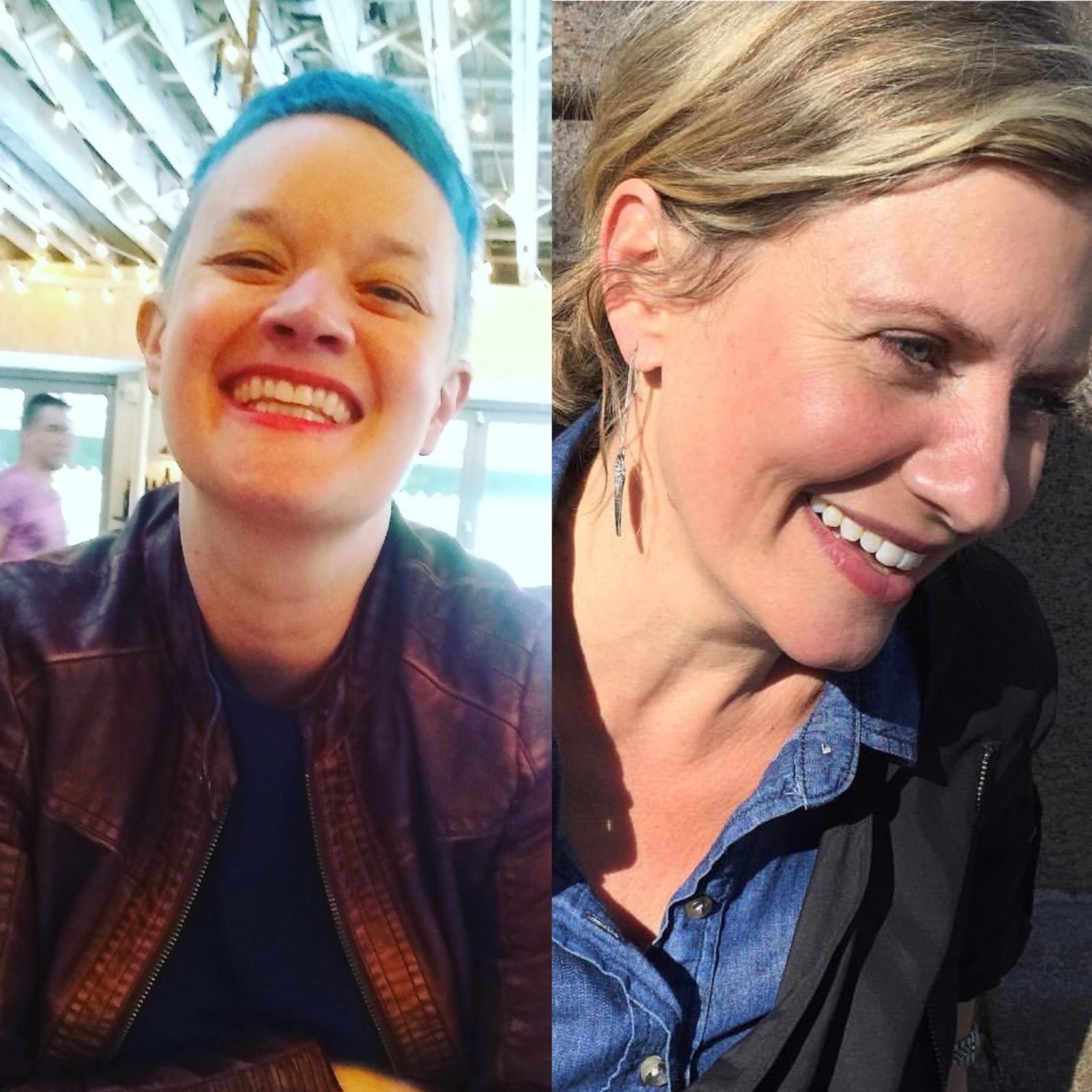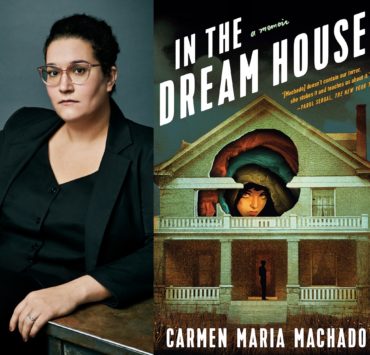
Across time and space, Carley Moore and Nicole Calihan meet to have a conversation to discuss their respective novels, The Not Wives and The Couples.
NC: Carley, all summer you were in my brain. It was like you were floating on a yellow raft on the other end of a very blue pool. I was reading The Not Wives, and then I would flip, and then I would read some more, and then I would flip again. I would think of the beautiful poetic riffs in the book, and they started to narrate my world for me, and I would hear your italicized words: The wives were floating in a very blue pool. The wives were flipping. The wives were reading their friends’ books. The wives were boiling eggs. The wives were cleaning dishes that they would then place into a machine which would further clean them. The wives knew the days were starting to get shorter.
I kept wanting to shout at you, tell you to come to my end of the pool, and we could create one of those floatillas and just float connected until human voices wake us…
CM: Oh, I Iove this so much. I need to get into that pool someday soon. I also like thinking of wives, who do so much in this world, as finally relaxing, and having some rest in flotillas instead of managing so much of the care, feeding, housing, and work of so many people in their lives. As a reader, you really got something about those sections–the wives, the not wives, the husbands, the children–that they are riffs and meant to be extended. Or maybe they are like a Greek chorus of sorts trying to name something collective in our lives.
Speaking of Greek choruses, when I read your novella, The Couples, I was struck by your mastery of plot, in tight spaces. The house becomes a small stage for couples and kids to figure out a storm and their relationships to one another. I know you are also working on play…and I want to know how will you do that? How do you think about plot? Or do it so well? The storm is such a force!
NC: Oh, storms, right? Plot. My daughter, Eva has been doing “fiction writing” in sixth grade. Here’s my advice: things HAVE to happen. They just have to. In life, we can see a whole slew of clouds forming, and coming towards us, and then just passing, but in stories they actually have to produce something. You can’t just have clouds; something needs to fall from the clouds.
So, maybe that’s why you and I also write poems and essays, because then, we can just spend a whole stanza or paragraph talking about the clouds and not really worrying about the rain. Or is the worrying implicit?
I wish we could be face-to-face right now. The wives and the not wives meet for a drink. The clouds are above them. The wives and the not wives toast. The wives and the not wives cry. The wives and the not wives pretend not to notice more clouds rolling in.
One thing I love about your novel is the setting–though “setting” feels like a word I don’t want to say, so I’ll say the sense of a very specific place in a very specific time. How important do you believe place & time are to fiction? How do you see place & time as different in relation to the other genres?
I go back to thinking about the poetic bursts in your novel–the Greek chorus of them–and so I also want to know if these chapters–the litanies of the wives/ not-wives/ husbands–came while you were writing the narrative, or before, or, perhaps, as something you added after.
CM: Oh, hi. I’m back. I’d like to be in person too. I’m not going to SF anymore this weekend because of black outs and exhaustion and I’ve run out of money, so maybe Friday afternoon? I’ll write a bit more though.
The wives and the not wives meet for an aperol spritz. The wives and the not wives are hungry too. It’s funny you mention Eva and learning how to write fiction in sixth grade because I feel like my daughter Malka taught me a lot about fiction writing when she was learning how to in the 4th and 5th grade. We would both talk about our books on the walk to school. She would say to me, “Mama, there has to be a problem in the beginning of your book, otherwise it will be boring,”. She was right. It took me a lot of drafts to figure out what those initial problems would be, which eventually became the engine for the book. A non-tenured professor witnesses a student-suicide and is in trauma, she loses her housing, and is afraid because she’s broke.
In some way, I think this gets at setting. I am trying to write about worlds I know well: the lives of NYC artists, teachers, activists, and parents, some queer and some not. Occupy in the fall of 2011 was such a specific place (Zuccotti Park) and historical moment (when we first really began to talk publicly about debt and shame and to hold banks accountable or to try at least). I wanted to capture that moment– a changing New York, a dating New York and a parenting and teaching New York– which to me have always been so interesting. I love how NYC looks after a date at midnight as opposed to its other strange beauty on a playground in the late afternoon. I love how the sidewalks tilt in the East Village and how the Hudson looks at Sunset. I like the look of bars and people in them, they are such interesting waiting rooms and where so much happens in NYC.
I like the idea of a house as a setting and one long weekend which is what happens in The Couples. But that is only the present, what about the past for Julia? Can you talk about the landscapes of her childhood? Those flashbacks are some of my favorite passages in the book–haunting and real and grappling with so much.
NC: I will talk about the past, of course; I love to talk about the past. But first, I read “such interesting wanting rooms,” and I was like, oh yes, I have spent many hours in such rooms.
I knew that for my novella I wanted a woman who was trying to reconcile who she had been with who she had become. For me, reconciliation is just so interesting–the ways we operate–the date at midnight New York knocking up against the late afternoon playground New York–the shopping at the Farmer’s Market self knocking up against the teenage Slurpee-drinking self–good mother self or teacher self or desirous self–it always amazes me that these can occupy a single consciousness, a single body.
The character that emerged when I was thinking of all of this was Julia. I wanted Julia to be from a single place–the panhandle of Oklahoma–and have been deposited somewhere totally different–the shoreline of Connecticut. Of course, the landscape of her childhood is not just Oklahoma, but the emotional landscape of a distant mother, a stepfather with varying degrees of competence, a much older boyfriend/lover. Honestly, I feel so hard for Julia when I re-read those scenes. I absolutely cringe. I’m like, oh god, you sad, sad child. I just want to hold her. Also, I’m like, who would write this stuff? How on earth did I let this grow and form in my brain and then allow it to escape?!?!
One thing I love about your book is the absolute no-shame, no-holds-barred. (But, the way you write about SEX. Holy wow! I can’t tell you how many times I picked up the phone and was like, Do you think Carley is as good at sex as she is at writing about sex? I mean, you are SO good. Tell me everything.
CM: Hahahaha, I see what you’re trying to do here. I will get to the sex part in a second, but first, I love thinking about shame and not shame. There are moments in The Couples, like in the hot tub when they are all talking about when each of them lost their virginity and some of the other characters try to shame Julia or she feels some intense shame, but she also resists this feeling in herself which I love, and pushes back on the other characters. Or at least she owns it, which is as much as any adult can do with a feeling, I suppose.
And now for the sex. Am I good at it? Lol, well, my characters are good at sex, in that, it’s a vital life force for all of them in some way, and they are all sex-positive sluts, so I will let everyone else decide it that means I am good at sex. I was very intentional about the way I wrote my sex scenes. I wanted them to be hot and real and sometimes amazing and sometimes boring. I want my female characters to have pleasure and feel no shame in it. The female pleasure is political. Our bodies are so policed and controlled, and so we’ve got to have fun if we can.
My protagonist Stevie and yours Julia have this in common I think.They care about pleasure, they are both moms, they want to have fun, and they are good mothers. I think the child Julia also uses sex the way the adult Stevie does–as escape, as a way to find herself, and as a way to feel free.
NC: Ah, freedom: the soul’s floatilla…
So, what’s next for the work? I realize that neither of us are doing our first rodeo. Will you write another novel?
CM: Ah the flotilla. It’s fall which means that all teachers are practically as far from the summer as we can get, but teaching is nice too. I’m working on another novel. It’s going slowly but it’s starting to make sense to me. There are some secret exciting things in the works; light a candle for me if you do that kind of thing. Otherwise, I’m just writing, teaching, momming, dating, you know. How about you? What are you working on?
NC: Well, I just lit a candle (good luck, my dear!), and it’s raining. In one open window, I’m planning tomorrow’s classes, and in another open window, I’m revising a poetry manuscript, all the while making sure the real windows are closed so the rain doesn’t get in, and awaiting the call from the bus stop since I’m certain I forgot to tell Eva to take an umbrella, and I’m pretty sure she didn’t take one herself. Which is to say, it seems, I’m settling into fall, and ready for what it brings. Xo.
Nicole Callihan writes poems, stories and essays. Her work has appeared, or is forthcoming in, among others, American Poetry Review, Painted Bride Quarterly, Tin House, Copper Nickel, Plume, and as a Poem-a-Day feature from the Academy of American Poets. The Assistant Director and a Senior Language Lecturer at New York University’s Tandon School of Engineering, Nicole frequently collaborates with artists and actors throughout New York City.
Her novel, The Couples is available for purchase here.
Carley Moore’s books include a novel, The Not Wives (Feminist Press, 2019), 16 Pills, an essay collection (Tinderbox Edition 2018), a poetry chapbook, Portal Poem (Dancing Girl Press 2017), and a young adult novel, The Stalker Chronicles (Farrar, Straus, and Giroux 2012).
Her novel, The Not Wives is available for purchase here.








